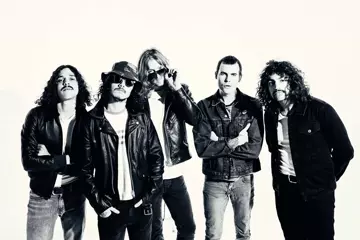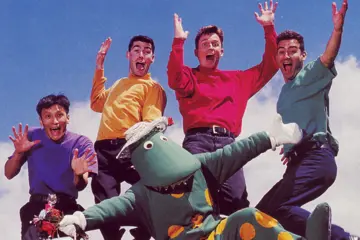Taking on the lead role in David Bowie’s musical Lazarus seems like a daunting task – for Chris Ryan, who plays Thomas Newton, that is certainly the case.
The only way to get around that fear is to “block out what expectations people might bring to it”, and focus instead on the work itself, as well as on Bowie’s 50-year oeuvre: “This constant reinvention, alter egos, that's something that I think any actor's drawn to and certainly something I've always toyed with my whole life.”
David Bowie put together the play with Irish playwright, Enda Walsh, known for his musical adaptation of the film Once. The production weaves together classic Bowie songs with a handful of new ones, each later released on his last record, Blackstar, and posthumous 2017 EP, No Plan. Lazarus continues the story told in Walter Tevis’ 1963 novel The Man Who Fell To Earth, and its 1976 film adaptation, in which Bowie starred.
The story follows Thomas Newton, a humanoid alien stranded on earth and battling with his own lack of mortality, unable to be sated by or find meaning in the wealth he has amassed at the top of the corporate world. Michael C Hall (Dexter) took on the Newton role in both in New York in late 2015, and in London in late 2016.
Don't miss a beat with our FREE daily newsletter
Bowie’s last public appearance, before he died from liver cancer in early January the following year, was at the NY production’s opening night in November 2015.
Ryan sees Lazarus as a “kind of meditation, like [Bowie’s] last album Blackstar, on death and transcendence”, set against the backdrop of post-capitalist America. “A man is holed up in his apartment – he was at the top of the corporate world and has shunned it all – [and] is living a life of isolation, heartbreak and longing to return back to his home planet.”
Almost deliberately, Ryan hasn’t seen a production of Lazarus before, or even the entirety of The Man Who Fell To Earth. He has spoken to Hall, but he places importance on “meeting it ourselves as a piece of theatre”.
“I think it’s impossible to try to emulate Bowie,” Ryan begins. “I wouldn't dare try to replicate David Bowie. I think I'm more fascinated in the fact that this was kind of a really important project for him, the things that were really stimulating and occupying him at that moment in time.”
Instead what Ryan will do is filter through what’s of use to them from “the huge, broad, eclectic, tangible almost, world of Bowie”.
“But certainly we're not doing the sequel of The Man Who Fell To Earth, and I'm not gonna be dying my hair strawberry blond or anything like that to try to be Bowie.”
“I wouldn't dare try to replicate David Bowie"
Natasha Pincus, the filmmaker doing the installation work for the Australian production, has told Ryan that she “swears that Bowie’s with her a lot of time while she’s doing all this stuff”.
“So hopefully he'll give me a bit of a hand as well,” Ryan laughs, adding that he didn’t come to the project as a Bowie super fan. “It's hard to know where to start sometimes with someone with such a huge body of work and influence.”
We ask if Ryan has had to grapple with the spectre of mortality in preparation for the role – the piece returns again and again to the question of death, both in the immortality of its central character, its delving into existential questions, and in its place as one of the last pieces of work Bowie created before he died.
“To tell you the truth, it's very strange… For whatever reason, a lot of stuff has surfaced for me recently around mortality, death, dying, fears that I've never really consciously had to deal with or think about before. I had friends suggesting to me the other day that perhaps it was happening for a reason for the show, which is great, thanks, I'm glad I said yes to this.”
That thought of being paralysed by existential dilemmas is one Ryan thinks is a “fascinating and very human response”.
“I don't know how I'm going to approach it,” Ryan ponders. “All I can say is that it's very much present with me at the minute and it's very much present in the work. It's that classic, human [question]: ‘How do you continue to live, and continue to persist and create and push out there when you're faced with the kind of bigger questions of mortality?'
“And for the central character he's kind of stuck in it, he's really stuck. I'm not expecting it to be the most comfortable space to be in, but hopefully there will be a catharsis in performing it – [that’s] what I'm hoping for.”
Ryan notes that like any piece of good theatre, Lazarus “holds up a mirror” to the world, a world in which “people are kinda scared and confused and feeling a bit adrift and a little lost”. But he stresses that it’s not all seriousness, and that he’s excited to have the opportunity to sing these “fucking awesome songs”.
“[Bowie’s] just a giant, and who wouldn’t want to get engaged with something that he’d proposed and created?”
Ultimately Ryan hopes that the audience both find meaning in the work, and have a really great time along the way.
“I hope there's something really shared and cathartic and beautiful about [seeing Lazarus], and look, there's great rock'n'roll in it – it's fun and kind of wild. I think any good piece of theatre while holding up a mirror should do it in an entertaining way, so I hope people can get something a bit deeper out of it but also just have a really great time.”















